‘Bad Jews’ Review
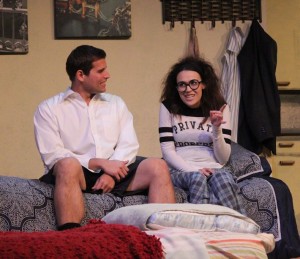 Stand in the foyer of any theater as people leave a performance of Bad Jews and what will emerge from the deafening din of après-theater buzz are reactions like “funniest play I ever saw,” “my ribs hurt,” “I haven’t laughed that much in years” and (my personal favorite) “I laughed so hard I almost peed myself.” Yes, Lab Theater’s production of Joshua Harmon’s Bad Jews is that funny. But it is also a gemstone of fine acting.
Stand in the foyer of any theater as people leave a performance of Bad Jews and what will emerge from the deafening din of après-theater buzz are reactions like “funniest play I ever saw,” “my ribs hurt,” “I haven’t laughed that much in years” and (my personal favorite) “I laughed so hard I almost peed myself.” Yes, Lab Theater’s production of Joshua Harmon’s Bad Jews is that funny. But it is also a gemstone of fine acting.
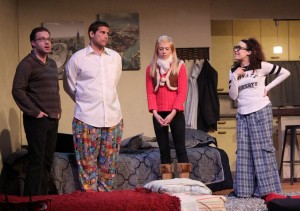 First and foremost, you don’t have to be Jewish or a millennial to appreciate Joshua Harmon’s humor. While many reviews discuss this play in terms of religious faith and cultural assimilation, under Stephanie Davis’ enlightened direction, Lab Theater’s production is more about envy and enmity between family members, the modern-day disintegration of social boundaries, and the
First and foremost, you don’t have to be Jewish or a millennial to appreciate Joshua Harmon’s humor. While many reviews discuss this play in terms of religious faith and cultural assimilation, under Stephanie Davis’ enlightened direction, Lab Theater’s production is more about envy and enmity between family members, the modern-day disintegration of social boundaries, and the 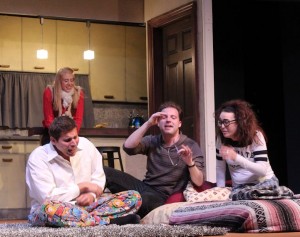 growing divide between young adults who value their family heritage and those who find such pursuits a complete and utter waste of time.
growing divide between young adults who value their family heritage and those who find such pursuits a complete and utter waste of time.
In the case of this particular play, it helps to know that what inspired the playwright was his visceral reaction to a Holocaust memorial service in which the speakers were not death camp survivors, but their grandchildren. Harmon found their discussions unmoving and more than a little 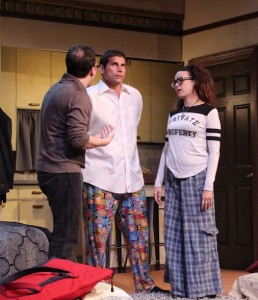 frightening because they revealed a complete lack of appriciation and understanding of what Holocaust survivors really went through. So don’t look for complex, fully fleshed out characters. Harmon keeps Daphna, Liam, Jonah and Melody intentionally superficial, just like the kids that spoke during the Holocaust memorial he found so abhorrent.
frightening because they revealed a complete lack of appriciation and understanding of what Holocaust survivors really went through. So don’t look for complex, fully fleshed out characters. Harmon keeps Daphna, Liam, Jonah and Melody intentionally superficial, just like the kids that spoke during the Holocaust memorial he found so abhorrent.
Harmon gives us little, if any, rationale for why Daphna and Liam hate each other as passionately and completely as they do. Perhaps Poppy preferred one over the other. Perhaps their parents were competitive kept score through 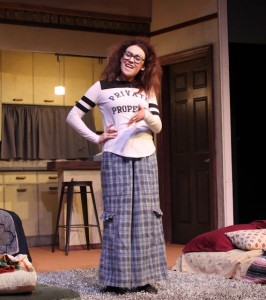 their kids’ grades, college admissions and accomplishments. As far as Daphna is concerned, Liam is an entitled little bastard whose parents hand him everything, including an all-expenses-paid ski trip to Aspen and an Upper West Side apartment. From Liam’s perspective, Daphna is a smug, snarky holier-than-thou bitch whose “righteousness” is actually “self-righteousness.” Families have fractured over issues far less weighty than these. Just ask any third or fourth or fifth generation Italian, Irishman or member of any other ethnic group.
their kids’ grades, college admissions and accomplishments. As far as Daphna is concerned, Liam is an entitled little bastard whose parents hand him everything, including an all-expenses-paid ski trip to Aspen and an Upper West Side apartment. From Liam’s perspective, Daphna is a smug, snarky holier-than-thou bitch whose “righteousness” is actually “self-righteousness.” Families have fractured over issues far less weighty than these. Just ask any third or fourth or fifth generation Italian, Irishman or member of any other ethnic group.
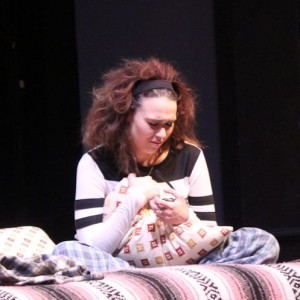 What’s interesting about this particular family is their willingness to say really vile things to each other rather than behind their back. Neither Daphna nor Liam has apparently ever encountered a psychological or personal boundary they couldn’t gleefully disregard. They say aloud all the horrible things that pop into their overly judgmental minds without filter or sensitivity. They are live versions of the way we speak to and about each other on Facebook, Twitter and other social media platforms. In Daphna and Liam’s worlds,
What’s interesting about this particular family is their willingness to say really vile things to each other rather than behind their back. Neither Daphna nor Liam has apparently ever encountered a psychological or personal boundary they couldn’t gleefully disregard. They say aloud all the horrible things that pop into their overly judgmental minds without filter or sensitivity. They are live versions of the way we speak to and about each other on Facebook, Twitter and other social media platforms. In Daphna and Liam’s worlds, 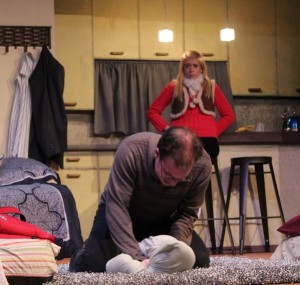 social grace and good manners are passe,’ tragic casualties to bitter condemnation and snide rejoinder.
social grace and good manners are passe,’ tragic casualties to bitter condemnation and snide rejoinder.
The tension that Harmon creates as his characters expose and excoriate these social and familial phenomena can only be released in one of two ways, and since people are still reluctant to cry in front of each other, especially in social settings, the audience finds itself laughing and laughing harder as the story progresses (or 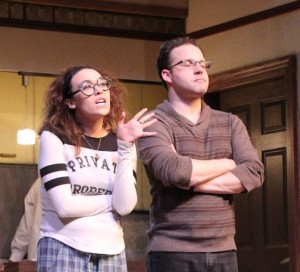 devolves, depending on your perspective).
devolves, depending on your perspective).
Ruiz turns in a command performance as the scheming, petulant, judgmental Daphna. Her lilting voice drips sarcasm. Her brows furrow with unconcealed condescension. Her pouty lips curl with self-righteous indignation. She circles, stalks and then pounces on her cousins and Liam’s hapless girlfriend, Melody. In Ruiz’s capable hands, Daphna unleashes her rapier wit and Mensa-level intelligence to surgically eviscerate 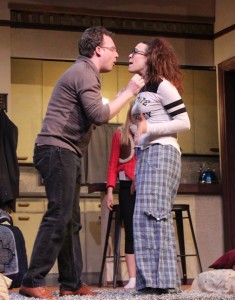 anyone who opposes her. But in spite of this, Ruiz never forgets that hers a comic rather than dramatic role. She delivers one scathing line after another with impeccable timing, encouraging the audience to roil with laughter that threatens to drown out the next verbal barb or rejoinder.
anyone who opposes her. But in spite of this, Ruiz never forgets that hers a comic rather than dramatic role. She delivers one scathing line after another with impeccable timing, encouraging the audience to roil with laughter that threatens to drown out the next verbal barb or rejoinder.
Matt DeNoncour is Ruiz’s equal. His portrayal of the smug, self-absorbed, unyielding Liam is no less visceral and emotive. However, unlike Daphna, who needs little provocation or needling to explode in one vicious diatribe after another, DeNoncour’s Liam tries to avoid confrontation. First, he tries to induce his parents to let him and Melody stay with them for the 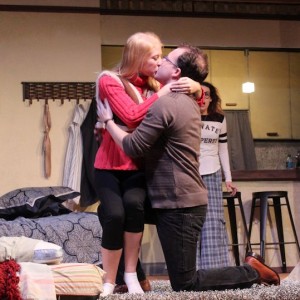 night. Even when that fails, he tries choking back his impulse to strangle Daphna. But once he lets loose, he joins the fray with the savagery of a streetfighter who’s taken a kick to the groin. He has no qualms about getting down and fighting dirty. Although he pounds a pillow rather than pummel his cousin, he does not restrain his verbal assault, giving voice to ugly misogyny, much to his girlfriend’s horror (if not the audience’s as well).
night. Even when that fails, he tries choking back his impulse to strangle Daphna. But once he lets loose, he joins the fray with the savagery of a streetfighter who’s taken a kick to the groin. He has no qualms about getting down and fighting dirty. Although he pounds a pillow rather than pummel his cousin, he does not restrain his verbal assault, giving voice to ugly misogyny, much to his girlfriend’s horror (if not the audience’s as well).
There’s no denying that Daphna and Liam 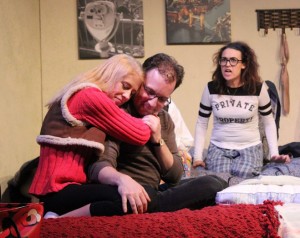 are unlikeable, unappealing caricatures, and thus we have no compunction about laughing at how they act toward and treat each other. They’re so repugnant that they deserve the tongue-lashing they receive. But Harmon made them shallow and reprehensible for more than just entertainment and laughs. In writing Bad Jews, he was lampooning the participants in that awkward Yom Hashoah service that he attended in college. To
are unlikeable, unappealing caricatures, and thus we have no compunction about laughing at how they act toward and treat each other. They’re so repugnant that they deserve the tongue-lashing they receive. But Harmon made them shallow and reprehensible for more than just entertainment and laughs. In writing Bad Jews, he was lampooning the participants in that awkward Yom Hashoah service that he attended in college. To 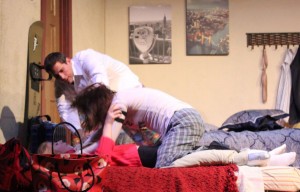 Harmon’s way of thinking, it’s not someone’s embrace of the Torah and Jewish traditions that renders her a good Jew any more than someone’s repudiation of his religion and culture that makes him bad. That way of thinking is wholly misguided. The good Jew in Harmon’s world is epitomized by the quiet, reflective, perhaps semi-
Harmon’s way of thinking, it’s not someone’s embrace of the Torah and Jewish traditions that renders her a good Jew any more than someone’s repudiation of his religion and culture that makes him bad. That way of thinking is wholly misguided. The good Jew in Harmon’s world is epitomized by the quiet, reflective, perhaps semi-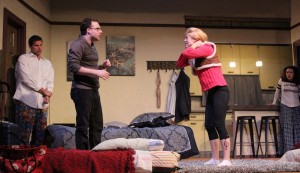 autobiographical Jonah, who (spoiler alert) is the only one of the three who seeks to truly understand what his Poppy (people) really went through during the Holocaust by walking in his worn, mud-caked shoes. That is the proper role of heritage and tradition. For it is only by learning the lessons of those who came before us can we
autobiographical Jonah, who (spoiler alert) is the only one of the three who seeks to truly understand what his Poppy (people) really went through during the Holocaust by walking in his worn, mud-caked shoes. That is the proper role of heritage and tradition. For it is only by learning the lessons of those who came before us can we 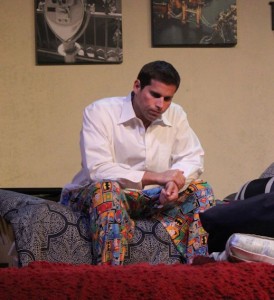 hope to avoid making the same mistakes. That applies whether you are Jewish or Catholic, Protestant, Muslim, Buddhist, Hindu or atheist. And one need only look to the lack of civility and unwillingness to engage in respectful, meaningful discourse in the current presidential races on both sides of the Republican-Democrat, conservative-liberal divide to appreciate the true message that Harmon seeks to give through the expediency of the battling cousins in his play Bad Jews.
hope to avoid making the same mistakes. That applies whether you are Jewish or Catholic, Protestant, Muslim, Buddhist, Hindu or atheist. And one need only look to the lack of civility and unwillingness to engage in respectful, meaningful discourse in the current presidential races on both sides of the Republican-Democrat, conservative-liberal divide to appreciate the true message that Harmon seeks to give through the expediency of the battling cousins in his play Bad Jews.
- Click here for a synopsis, play dates, times and ticket information.
- Spotlight on ‘Bad Jews’ playwright Joshua Harmon.
- Spotlight on ‘Bad Jews’ director Stephanie Davis.
Published March 11, 2016.














 Tom Hall is both an amateur artist and aspiring novelist who writes art quest thrillers. He is in the final stages of completing his debut novel titled "Art Detective," a story that fictionalizes the discovery of the fabled billion-dollar Impressionist collection of Parisian art dealer Josse Bernheim-Jeune, thought by many to have perished during World War II when the collection's hiding place, Castle de Rastignac in southern France, was destroyed by the Wehrmacht in reprisal for attacks made by members of the Resistance operating in the area. A former tax attorney, Tom holds a bachelor's degree as well as both a juris doctorate and masters of laws in taxation from the University of Florida. Tom lives in Estero, Florida with his fiancee, Connie, and their four cats.
Tom Hall is both an amateur artist and aspiring novelist who writes art quest thrillers. He is in the final stages of completing his debut novel titled "Art Detective," a story that fictionalizes the discovery of the fabled billion-dollar Impressionist collection of Parisian art dealer Josse Bernheim-Jeune, thought by many to have perished during World War II when the collection's hiding place, Castle de Rastignac in southern France, was destroyed by the Wehrmacht in reprisal for attacks made by members of the Resistance operating in the area. A former tax attorney, Tom holds a bachelor's degree as well as both a juris doctorate and masters of laws in taxation from the University of Florida. Tom lives in Estero, Florida with his fiancee, Connie, and their four cats.